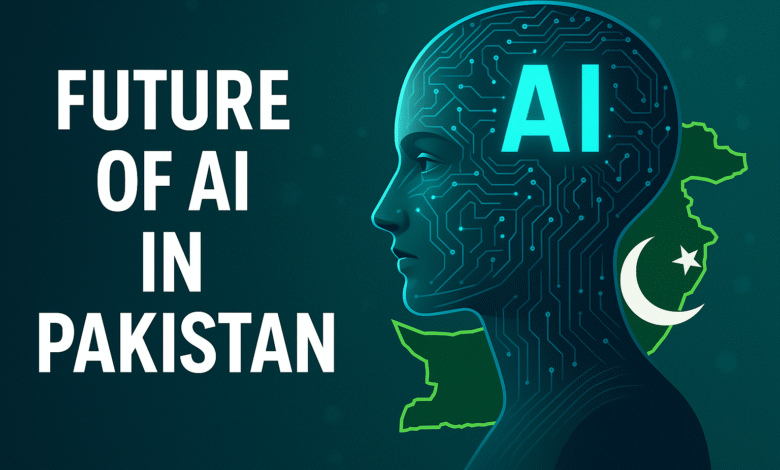Future of AI in Pakistan – Jobs, Risks & Opportunities
The future of AI in Pakistan is filled with promising opportunities, yet it also presents a series of challenges and risks that need strategic planning and proactive policymaking.

Artificial Intelligence (AI) is transforming economies, reshaping industries, and redefining the way we work, live, and interact. Across the globe, nations are racing to adopt AI technologies to gain a competitive edge. Pakistan, with its burgeoning youth population, growing tech landscape, and government interest in digital transformation, stands at a pivotal point. The future of AI in Pakistan is filled with promising opportunities, yet it also presents a series of challenges and risks that need strategic planning and proactive policymaking.
The Rise of AI in Pakistan
In recent years, Pakistan has witnessed an increasing interest in emerging technologies. The government launched several initiatives, such as the Digital Pakistan Vision and Presidential Initiative for Artificial Intelligence and Computing (PIAIC), aimed at making the country a digital hub. These steps have accelerated public awareness and investment in AI education, research, and infrastructure.
The rise of AI startups, partnerships with international organizations, and a focus on machine learning (ML), natural language processing (NLP), and data science indicate a growing ecosystem. Universities like NUST, LUMS, and COMSATS have introduced AI degree programs, while incubators and accelerators are supporting tech entrepreneurs exploring AI-driven solutions.
Job Creation and Economic Transformation
One of the most critical aspects of AI’s future in Pakistan is its potential to transform the job market. Contrary to the popular fear of AI replacing human jobs, it is more accurate to say that AI will change the nature of work.
New categories of jobs are emerging, such as
-
AI Engineers
-
Data Scientists
-
Machine Learning Developers
-
AI Ethics Specialists
-
AI Product Managers
According to global trends, countries that invest in AI see an uptick in high-skilled employment. Pakistan’s youth can benefit from this if provided with the right technical training and digital education. The expansion of freelance AI-related services on platforms like Upwork and Fiverr is another area where Pakistan can shine, given its status as one of the top freelance economies in the world.
Additionally, AI in agriculture, telemedicine, e-commerce, financial technology (fintech), and education tech (edtech) can lead to thousands of indirect jobs through enhanced productivity and innovation.
AI in Public Sector and Governance
The public sector in Pakistan can benefit immensely from AI applications. Government agencies can use predictive analytics, chatbots, and automated systems to improve service delivery, reduce corruption, and enhance citizen engagement.
For example:
-
Smart traffic systems in urban areas can reduce congestion.
-
AI-driven healthcare databases can optimize patient care and resource allocation.
-
Fraud detection algorithms can combat tax evasion and financial crime.
With proper implementation, AI in governance can reduce inefficiencies and help create a transparent and data-driven public sector.
Risks and Challenges Ahead
Despite its potential, the future of AI in Pakistan is not without risks. These include:
1. Job Displacement in Traditional Sectors
While AI creates new job roles, it may also automate repetitive tasks, affecting low-skilled workers in manufacturing, customer service, and administration. This displacement can lead to economic inequality if reskilling programs are not implemented in time.
2. Data Privacy and Ethical Concerns
AI systems depend on vast amounts of data. Without robust data protection laws, there’s a risk of surveillance, data misuse, and privacy breaches. Pakistan currently lacks a strong legal framework to govern AI ethics, which could lead to misuse of sensitive information.
3. Lack of Infrastructure and R&D
For AI to flourish, a country needs a strong foundation in cloud computing, high-speed internet, and research and development (R&D). Pakistan is still developing in these areas. Limited funding for AI research, brain drain, and poor collaboration between academia and industry are critical bottlenecks.
4. Skill Gaps and Digital Divide
Although Pakistan has a large youth population, many lack access to quality education, especially in rural areas. Without bridging this digital divide, AI may widen existing socio-economic gaps, creating a technology elite while leaving behind millions.
AI in Key Industries in Pakistan
1. Agriculture
Pakistan’s economy heavily depends on agriculture, which is often plagued by inefficiencies. AI can revolutionize this sector through:
-
Crop monitoring via drones
-
AI-powered irrigation systems
-
Predictive analytics for weather patterns
-
Disease detection through image recognition
This can increase yield, reduce waste, and help farmers make data-informed decisions, boosting rural income.
2. Healthcare
The application of AI in healthcare can improve access, diagnosis, and treatment:
-
AI diagnostic tools can assist doctors in remote areas.
-
Telemedicine platforms with AI chatbots can offer 24/7 support.
-
Data analytics can identify disease outbreaks early.
With Pakistan’s strained healthcare system, AI solutions can offer affordable and scalable alternatives.
3. Education
AI can transform education in Pakistan by offering
-
Personalized learning paths using adaptive learning software
-
Intelligent tutoring systems
-
Automated grading tools
These can improve student outcomes while reducing the load on teachers. Moreover, AI-powered e-learning platforms can reach remote and underserved areas, promoting educational equity.
4. Financial Services
The fintech revolution is gaining momentum in Pakistan. AI is driving innovation in:
-
Credit scoring algorithms
-
Fraud detection
-
Robo-advisors for investment
-
AI-powered customer support
With increased smartphone penetration and the rise of digital banking, AI will play a central role in financial inclusion and economic empowerment.
Government Initiatives and Policies
The government of Pakistan has taken commendable steps to position the country on the AI roadmap. Key policies and initiatives include
-
Pakistan Artificial Intelligence Policy (Draft)—Focuses on building AI capacity, investing in R&D, and creating ethical guidelines.
-
National Center for Artificial Intelligence (NCAI)—Supports AI research at major universities.
-
PIAIC (Presidential Initiative)—Offers courses in AI, blockchain, and cloud computing.
However, these initiatives need sustained funding, accountability, and public-private partnerships to make a lasting impact.
Opportunities for Entrepreneurs and Startups
Pakistan’s startup ecosystem is booming, and AI offers fertile ground for innovation and disruption. From AI-powered marketplaces to health-tech platforms, young entrepreneurs are already making strides.
Some notable areas of opportunity include
-
Voice recognition apps in local languages
-
AI for Urdu NLP
-
AI-based security surveillance systems
-
Predictive analytics for retail and logistics
The availability of open-source AI tools and cloud-based services lowers the entry barrier, allowing small startups to compete on a global scale.
What Needs to Be Done: The Roadmap Forward
For Pakistan to fully embrace the AI revolution, a multi-pronged approach is required:
1. Invest in Education and Skilling
Establish AI-focused academies, update curriculums, and invest in online platforms offering AI, ML, and data science courses. Scholarships and subsidies should be introduced for underprivileged students to democratize access to AI education.
2. Strengthen Legal and Ethical Frameworks
Pakistan must enact strong data protection laws, establish AI regulatory bodies, and encourage ethical AI practices. This ensures responsible deployment and protects citizens’ rights.
3. Build Infrastructure and R&D Capacity
Invest in supercomputing centers, data centers, and research labs. Encourage collaboration between universities, tech companies, and government agencies to create an AI innovation ecosystem.
4. Promote Inclusive Growth
Ensure that AI benefits reach all segments of society. Focus on rural areas, women, and marginalized communities through inclusive AI policies and local language tech solutions.
Global Collaboration and AI Diplomacy
Pakistan should actively engage in international AI forums, seek technology transfer agreements, and invite global AI companies to invest in the country. Collaboration with countries like China, which is leading in AI, can help Pakistan leapfrog stages of development.
Conclusion: A Future Worth Building
The future of AI in Pakistan is filled with immense potential. With a young, dynamic population and growing digital adoption, Pakistan can harness AI not just for economic gains, but for social good, inclusion, and development.
However, realizing this potential requires visionary leadership, investment in people, and strong institutions. If addressed wisely, AI can become the catalyst that propels Pakistan into the 21st-century knowledge economy and makes it a regional leader in technology and innovation.











